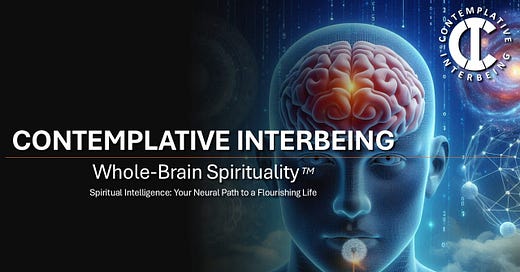As we explore the remarkable evolution of the human brain, one of the most striking features is the development of our frontal lobes. These lobes, which make up a significantly larger proportion of our brain compared to other animals, provide us with a unique capability to transcend the immediacy of experience. The defining features of the human condition can all be traced to our ability to stand back from the world, from our selves and from the immediacy of experience. [1] This ability is foundational to human nature. Unlike animals, who generally respond instinctively and passively to their environments, humans possess the capacity to step back from our immediate surroundings, reflect on them, and make conscious decisions about how we will engage with the world. The frontal lobes make it possible for us to think flexibly, plan ahead, and act creatively, allowing us to both interact with the world around us and reflect on the broader context in which we exist. This capacity to rise above the here and now not only defines our intellect but also lays the groundwork for our emotional and social growth, making it a cornerstone of the human experience.
This ability to create distance from the immediate also plays a crucial role in how we connect with others. By standing back from the animal immediacy of our experience we are able to be more empathic with others, who we come to see, for the first time, as beings like ourselves. [1] When we take a step back and look beyond our own personal experience, we begin to see others not as distant or separate from ourselves but as fellow beings with their own thoughts, emotions, and struggles. This shift in perspective is not merely an intellectual exercise; it has a impact on how we relate to others. It enables us to build deeper, more meaningful relationships, as we learn to engage with others’ experiences in a way that is compassionate and understanding. The frontal lobes support this empathic engagement, allowing us to become more attuned to the feelings and perspectives of those around us. By cultivating this awareness, we enrich our social interactions, fostering connection and shared humanity.
At the same time, it’s important to recognize that there is a balance between immersion in the world and the distance needed for deeper understanding. There is an optimal degree of separation between our selves and the world we perceive, if we are to understand it. [1] If we immerse ourselves too fully in immediate experience, we can become overwhelmed by the present moment, losing the capacity to reflect or plan. Conversely, if we detach ourselves too much, we risk losing touch with reality, becoming disconnected from the world around us. The challenge, then, is to find a balance where we can fully engage with the world while still retaining enough distance to reflect on it and understand its greater meaning. This is precisely the function of the frontal lobes—to enable us to navigate between these two poles, ensuring that we remain grounded in the world while also having the mental space to think, plan, and reflect. This balance between direct engagement and reflective distance is key to a holistic understanding of both ourselves and the world.
Yet, this complex evolution of the frontal lobes is not one-sided; it has given us the ability to exploit as well as to empathize. The evolution of the frontal lobes prepares us at the same time to be exploiters of the world and of one another, and to be citizens one with another and guardians of the world. [1] The same cognitive powers that allow us to reflect on our environment and plan for the future also provide us with the potential to manipulate and control it. This duality is what makes us uniquely human: we are capable of using our brains for both self-interest and altruism. We can use our understanding of the world to shape it to our advantage, or we can use it to protect and nurture the world and each other. The evolution of the frontal lobes thus prepares us to balance our power with responsibility, fostering both our capacity for dominance and our potential for compassion. This duality highlights the moral challenge that comes with our advanced cognitive abilities: how do we use our power wisely and with empathy?
Finally, when we consider the division of the brain, we can see that it serves a functional purpose, allowing us to process the world in complementary ways. In order to control or manipulate we need to be able to remove ourselves from certain aspects of experience, and in fact to map the world from the vertical axis. [1] This division in the brain enables us to operate in two distinct but interconnected modes: one where we are immersed in the immediate experience, and another where we step back, take a broader view, and plan. This capacity for parallel processing is what makes the human brain so flexible and adaptable. The division of the brain allows us to respond quickly and instinctively to immediate stimuli, while also giving us the mental space to reflect, strategize, and plan for the future. In essence, the brain’s structure supports both our capacity for direct engagement with the world and our ability to take a detached, reflective view—both of which are crucial for navigating the complexities of life.
[1] Iain McGilchrist, The Master and His Emissary




